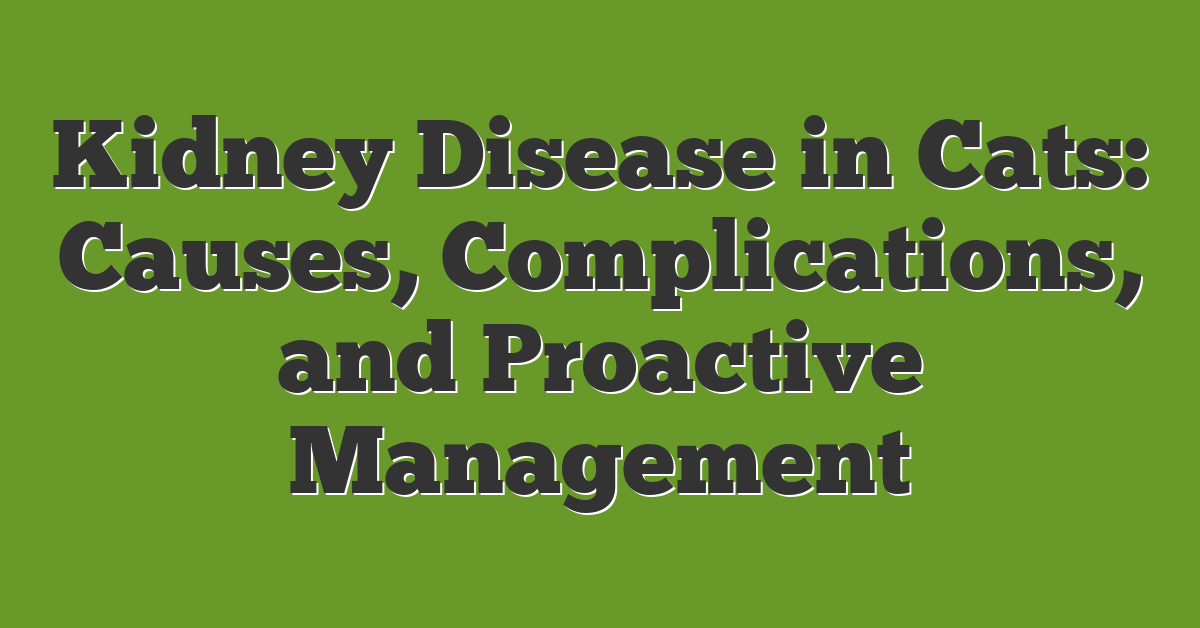What is Kidney Disease in Cats?
As a cat lover, you want to ensure that your feline friend stays happy and healthy. One health issue that you should be aware of is kidney disease in cats. Kidney disease is a common problem that affects many cats, especially as they get older. Understanding what kidney disease is and how it can affect your cat’s health is important for providing proper care.
Kidney disease, also known as renal failure, occurs when the kidneys are not able to function properly. The kidneys have an essential role in filtering waste products from the blood and producing urine. When the kidneys are damaged, they may not be able to effectively remove waste and toxins from the body. This can lead to a buildup of harmful substances, causing health problems for your cat.
There are two types of kidney disease in cats: acute and chronic. Acute kidney disease usually occurs as a result of a sudden injury, poisoning, or infection. On the other hand, chronic kidney disease develops gradually over time and is more common in older cats. Chronic kidney disease is a progressive condition that cannot be cured, but it can be managed.
It’s important to recognize the signs and symptoms of kidney disease in cats. Some common symptoms include increased thirst and urination, loss of appetite, weight loss, vomiting, and lethargy. If you notice any of these signs, it’s crucial to consult your veterinarian for a proper diagnosis and treatment plan.
Although the exact cause of kidney disease in cats is often unknown, there are several risk factors that may increase the likelihood of your cat developing the condition. These include:
- Age: Older cats are more prone to developing kidney disease.
- Breed: Certain breeds, such as Siamese and Persians, are more predisposed to kidney disease.
- Dental disease: Poor dental health can contribute to kidney problems.
- High blood pressure: Cats with high blood pressure are at higher risk for kidney disease.
- Certain medications and toxins: Some medications and toxins can damage the kidneys.
While kidney disease in cats cannot be cured, it can be managed with proper veterinary care and lifestyle changes. This includes providing a balanced diet specifically formulated for kidney health, ensuring your cat has access to plenty of fresh water, and monitoring their overall health regularly.
Signs and Symptoms of Kidney Disease in Cats
If you’re a cat lover, it’s important to be familiar with the signs and symptoms of kidney disease in cats. This way, you can detect any potential issues early and ensure your furry friend receives proper care. Here are some common signs to watch out for:
- Increased Thirst and Urination: If you notice that your cat is drinking more water than usual or making frequent trips to the litter box, it could be a sign of kidney disease. The kidneys play a vital role in maintaining the body’s fluid balance, so any disruptions can lead to excessive thirst and urination.
- Loss of Appetite and Weight: Kidney disease can affect your cat’s appetite. If you notice a sudden decrease in their interest in food or a significant weight loss, it’s time to pay attention. Loss of appetite can be a sign that the kidneys are not functioning properly and toxins are building up in the body.
- Vomiting and Diarrhea: Cats with kidney disease may experience digestive issues such as vomiting and diarrhea. These symptoms can occur due to the accumulation of waste products in the body, causing gastrointestinal distress.
- Lethargy and Weakness: Changes in energy levels and overall lethargy are common in cats with kidney disease. The build-up of toxins can make your feline friend feel tired, weak, and less playful than usual.
- Poor Coat Condition: Kidney disease can also affect the quality of your cat’s fur. If you notice that their coat looks dull, unkempt, or has excessive shedding, it could be a sign that their kidneys are not functioning optimally.
Remember, these signs and symptoms may vary from cat to cat, and they can also be associated with other health conditions. If you notice any of these signs or if you suspect that your cat may have kidney disease, it’s crucial to consult your veterinarian for a proper diagnosis and treatment.
Understanding the signs and symptoms of kidney disease in cats is essential for ensuring the well-being and quality of life of our beloved feline companions. Stay vigilant and provide the best care possible for your cat’s kidney health.
Understanding the Causes of Kidney Disease in Cats
Understanding the Causes of Kidney Disease in Cats
Did you know that kidney disease is a common health issue in cats? As a cat lover, it’s crucial to understand the causes of this condition. By knowing the causes, you can take steps to help prevent it or catch it early for better outcomes.
Here are some key factors that can contribute to kidney disease in cats:
- Aging: Just like humans, cats can experience age-related health problems. As your feline friend gets older, the risk of kidney disease increases. It’s important to provide regular check-ups to catch any signs early on.
- Genetics: Some cat breeds, such as Persians and Siamese, are more prone to developing kidney disease. If you have a purebred cat, it’s essential to be aware of this predisposition and take extra precautions.
- Dehydration: Cats need to stay well-hydrated for their kidneys to function properly. Lack of water intake can put a strain on their kidneys and increase the risk of developing kidney disease. Ensure that fresh water is always available for your feline companion.
- Diet: An improper diet can also be a contributing factor to kidney disease in cats. Feeding your furry friend a high-quality, balanced diet is crucial for maintaining their overall health, including kidney function. Consult with your veterinarian to choose the best food for your cat.
- Infections: Certain infections, like feline immunodeficiency virus (FIV) or feline leukemia virus (FeLV), can damage a cat’s kidneys over time. Regular veterinary check-ups and vaccinations can help prevent these infections and protect your cat’s kidney health.
Remember, knowledge is power when it comes to your cat’s health. By understanding the causes of kidney disease, you can make informed decisions to keep your feline companion happy and healthy. If you notice any changes in your cat’s behavior or health, don’t hesitate to consult your veterinarian for a proper diagnosis and treatment plan. Your cat’s well-being is worth it!
- American Association of Feline Practitioners
- Cornell University College of Veterinary Medicine
Risk Factors for Kidney Disease in Cats
When it comes to our beloved feline friends, it’s important to be aware of the risk factors for kidney disease. By understanding what can contribute to this condition, we can take steps to protect our cats’ health and well-being. Here are some key risk factors to keep in mind:
Age: Just like humans, cats can develop kidney disease as they get older. As your cat ages, their kidneys may not function as efficiently, making them more susceptible to the disease.
Genetics: Some cats may have a genetic predisposition to kidney disease. Certain breeds, such as Persians and Siamese, are more prone to developing this condition. If you have a cat from one of these breeds, it’s important to be vigilant about their kidney health.
Dehydration: Cats who don’t drink enough water are at a higher risk of kidney disease. Water helps to flush out toxins from their system and keeps their kidneys healthy. Encourage your cat to stay hydrated by providing fresh water daily and considering adding a water fountain to entice them to drink more.
Diet: A poor diet can contribute to the development of kidney disease in cats. Feeding your cat a balanced and nutritionally complete diet is essential for their overall health, including their kidney function. Consult with your veterinarian to determine the best diet for your furry friend.
Infections: Infections can also play a role in the development of kidney disease. Urinary tract infections or kidney infections can damage the kidneys over time if left untreated. It’s important to be vigilant and seek veterinary care if you notice any signs of infection in your cat.
By being aware of these risk factors, you can take proactive steps to prevent kidney disease in your feline friend. Remember to monitor your cat’s behavior and health closely and consult your veterinarian if you notice any changes or concerns.
Complications of Kidney Disease in Cats
Once a cat is diagnosed with kidney disease, it’s important to be aware of the potential complications that can arise. Managing these complications is crucial for your cat’s overall well-being. Here are some common complications to watch out for:
- Dehydration: Kidney disease can cause increased urine production, leading to dehydration. Keep an eye on your cat’s water intake and make sure they have access to fresh water at all times. If you notice your cat isn’t drinking enough water, speak to your veterinarian about potential solutions.
- Weight loss: Kidney disease can cause a decrease in appetite and weight loss in cats. It’s vital to ensure your cat is getting enough nutrition to maintain their weight. Talk to your veterinarian about the best diet options and consider feeding smaller, more frequent meals to entice their appetite.
- Electrolyte imbalances: The kidneys play a vital role in maintaining proper electrolyte balance in the body. With kidney disease, this balance can be disrupted. Your veterinarian may need to monitor your cat’s blood levels and prescribe electrolyte supplements if necessary.
- High blood pressure: Kidney disease can contribute to high blood pressure in cats. This can lead to further damage to the kidneys and other organs. Regular blood pressure monitoring and prescribed medications can help manage this condition.
- Anemia: The kidneys produce a hormone called erythropoietin, which stimulates red blood cell production. In kidney disease, the production of this hormone may be reduced, leading to anemia. Your veterinarian may recommend medications or dietary changes to address anemia in your cat.
- Urinary tract infections: Cats with kidney disease are more prone to urinary tract infections. Keeping the litter box clean and ensuring your cat can easily access it will help minimize the risk of infections. Contact your veterinarian if you notice any changes in your cat’s litter box habits or if they are displaying signs of discomfort while urinating.
Remember, early detection and proactive management of kidney disease can greatly improve your cat’s quality of life. Regular check-ups and open communication with your veterinarian are crucial in effectively managing the complications associated with kidney disease.
Kidney Disease in Cats Quick Facts
- Kidney disease in cats can be caused by various factors, including aging, genetics, dehydration, diet, and infections.
- Common signs of kidney disease in cats
Prevention and Management of Kidney Disease in Cats
Caring for your beloved cat also means taking proactive steps to prevent and manage kidney disease. By being aware of the potential causes and making some necessary adjustments, you can improve the overall health and well-being of your feline friend. Here are some key tips to help you along the way:
1. Ensure a Balanced Diet: Feeding your cat a nutritious and balanced diet is crucial in preventing kidney disease. Look for high-quality cat food that is specifically formulated to support kidney health. Avoid excessive amounts of treats, as they can contribute to weight gain and put extra strain on the kidneys.
2. Encourage Hydration: Cats are notorious for being finicky drinkers, but it’s important to make sure they stay well-hydrated. Provide fresh water in multiple locations and consider using a cat fountain or adding wet food to their diet to increase their water intake. Adequate hydration is vital for kidney function.
3. Regular Vet Check-ups: Regular veterinary check-ups are essential for monitoring your cat’s overall health and catching any potential kidney problems early. Your veterinarian will conduct routine blood and urine tests to assess your cat’s kidney function. Early detection allows for timely intervention and better outcomes.
4. Minimize Stress: Cats are sensitive creatures, and stress can contribute to the development and worsening of kidney disease. Create a calm and stress-free environment for your feline companion. Provide hiding spots, enrich their environment with toys and playtime, and maintain a routine to minimize stress levels.
5. Medication and Treatment: If your cat is diagnosed with kidney disease, your veterinarian may prescribe medication or dietary supplements to enhance kidney function, manage symptoms, and slow the progression of the disease. Follow your vet’s instructions carefully to ensure your cat’s well-being.
6. Monitor Fluid Balance: Keep an eye on your cat’s water intake and urine output. Excessive thirst, frequent urination, or changes in urine color or smell can be signs of kidney disease. Report any abnormalities to your veterinarian as soon as possible.
7. Open Communication: Maintain open communication with your veterinarian throughout your cat’s journey with kidney disease. They will guide you through treatment options, dietary recommendations, and any necessary lifestyle modifications. Together, you can create a care plan that best suits your cat’s needs.
Conclusion
Understanding the causes of kidney disease in cats is crucial for prevention and early detection. Aging, genetics, dehydration, diet, and infections can all contribute to this condition. By being aware of these factors, you can take proactive steps to protect your cat’s kidney health.
Kidney disease in cats can lead to various complications, including dehydration, weight loss, electrolyte imbalances, high blood pressure, anemia, and urinary tract infections. Detecting the disease early and managing it effectively can greatly improve your cat’s quality of life.
To prevent and manage kidney disease in cats, it’s important to ensure they have a balanced diet and stay hydrated. Regular vet check-ups are essential for monitoring their health and catching any issues early on. Minimizing stress, following medication and treatment plans, monitoring fluid balance, and maintaining open communication with your veterinarian are also crucial.
By implementing these preventive measures and staying proactive in your cat’s care, you can help safeguard their kidney health and ensure they live a long and healthy life.
Frequently Asked Questions
Q: What are the causes of kidney disease in cats?
A: The causes of kidney disease in cats can include aging, genetics, dehydration, diet, and infections.
Q: What are the potential complications of kidney disease in cats?
A: Potential complications of kidney disease in cats can include dehydration, weight loss, electrolyte imbalances, high blood pressure, anemia, and urinary tract infections.
Q: Why is early detection and proactive management important for kidney disease in cats?
A: Early detection and proactive management of kidney disease in cats is important to improve their quality of life and prevent further complications.
Q: How can kidney disease in cats be prevented and managed?
A: Kidney disease in cats can be prevented and managed by ensuring a balanced diet, encouraging hydration, regular vet check-ups, minimizing stress, medication and treatment, monitoring fluid balance, and maintaining open communication with a veterinarian.

















